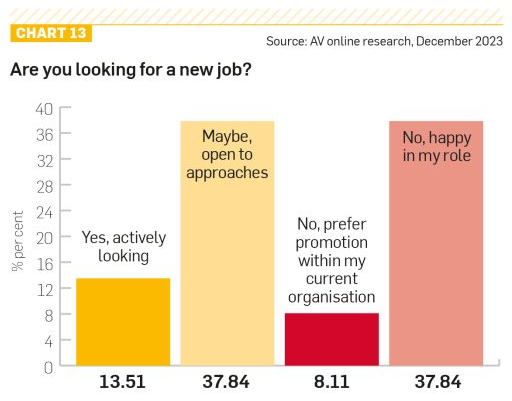Growing Pains in Growing the AV Workforce

Image Credit: Roman Pohorecki
As the world comes to rely more and more on audiovisual technology to function, the AV industry naturally grows as a response. Alongside this rapid growth, though, the AV industry still encounters stumbling blocks commonly seen in other industries, as well as other more industry-specific limitations. The past few years have represented a significant shift in the way the workforce approaches their jobs; between flexible work options, career advancement practices and pushing for inclusive, empathic employment, workers have made their priorities clear. This begs the question: How can providers adapt to the new workforce landscape, and maybe more importantly, will they adapt?
Sentiment among job seekers shows a cause-and-effect for why employee turnover may be higher across all industries. Remote and hybrid work opportunities, for example, have made a major impact on how candidates adjust their priorities when looking for a job. Remote work arrangements provide uniquely flexible benefits for candidates, such as what hours they work, where they work from, and what their relationship to their job looks like. In a survey conducted by Jabra, nearly 80% of respondents said their places of employment gave them flexibility in their work arrangements. This flexibility is also a benefit to workers when they are considering seeking a better opportunity.

Despite uncertainty around the current job market, more than half of those surveyed are still considering finding new employment. Source: AV Magazine
Recently, layoffs have impacted a number of industries, with tech being one of the largest sectors to suffer from workforce reductions. These layoffs contribute to a pillar of advice commonly held by both job seekers and those currently employed: "To advance or stay secure, keep your options open." Research corroborates this in a December 2023 study by AV Magazine, where over half of professionals surveyed responded that they would leave their current position for better opportunities or benefits. “When people have a good work-life balance, they are more likely to stay in a job and more likely to want to work for a company that respects their right to switch off,” says Katy Thorpe, Global People Director at Kinly.
The AV industry also faces more specific challenges for recruitment, namely in introductory pathways. Providers, organizations, and educational institutions are scrambling to build pipelines to get potential candidates into the workforce, but these are still reactionary measures. “We’re trying to reinvent how to get people to come on board with us, how to train them, and how to get them up to speed so that they can start working with us more consistently," says Mel Baglio, Director of Operations at AV Chicago. Baglio also notes the high demand for skilled workers as a major driver behind these initiatives, as providers struggle to staff up for jobs.
.jpg)
Many AV professionals attend InfoComm to network, seeking their next big opportunity.
Awareness acts as another bottleneck to growing the AV workforce. As the pool of potential candidates grows, especially for AV industry-adjacent professionals, highlighting AV as a viable career path is more important than ever. Speaking to Inavate, Matthew Wyatt of Carillion Communications echoes this sentiment. “We need more awareness of what a really good industry this is, [highlighting] the fantastic career paths that are available in the industry," says Wyatt.
Diversity and inclusiveness play a key part in expanding the AV workforce. Creating an equitable work environment is a must for providers, as underrepresented professionals navigate a predominantly-male industry. Christina Cruzeiro, co-chair of the AVIXA Women's Council, encourages men to also have an active hand in building a more equitable environment. “They need to find [a woman] within their organization that are trying to break through and get to that next step in their career, and they need to be that person’s champion,” says Cruziero. Finding a workplace can be even more precarious for underrepresented candidates, oftentimes having to conduct additional due diligence to avoid harassment and workplace bias.
Many recruitment struggles faced by the AV industry might not be unique, but they're nonetheless an essential part of building and maintaining a solid workforce. Providers have to fundamentally support professionals in order to attract talent, providing the flexibility, stability and pay candidates desire. A highly-retained and equitable workforce can also build a provider's reputation, as top tier talent seeks out employers that will properly compensate them for their skill. This, in turn, has the material impact of delivering the highest quality solutions to clients, driving long-term revenue for providers.
Recommended Content
The Immersive Industry Doesn’t Have a Creativity Problem. It Has an Operating Model Problem.






Please sign in or register for FREE
If you are a registered user on AVIXA Xchange, please sign in
For those looking for additional data on salary and compensation rates for AV Professionals, check out AVIXA's research on the topic here. It includes a salary dashboard for benchmarking specific roles and experience levels.